In Japanese, goshujinsama ご主人様 means the "master" of a servant, in anime, mostly of a maid. The word may also refer to the "owner" of a house or shop, to one's "husband," or to a pet's "owner."
Kanji
The word goshujinsama written with kanji is ご主人様. Its kanji are the one for "lord," aruji 主, plus "person," hito 人, and two honorifics: the o 御 prefix and the sama 様 suffix.
Since it kind of spells "lord person," you can guess from the kanji the word means someone important. A similar word, shujinkou 主人公, means "protagonist," for example.
Spellings of goshujinsama include:
- ご主人様
- ご主人さま
- 御主人様 (extra-formal, rarer)
- ごしゅじんさま (hiragana only, unlikely)
The word has honorifics on both sides, so it's in the o__san お〇〇さん pattern. But since the latter honorific is sama, it's a word that implies utmost reverence.
For the "master" meaning seen in anime, only sama is ever used. For the "husband" and "owner" meaning, goshujin ご主人. The variant goshujinsan ご主人さん isn't used as frequently.
"Master"
Most of the time, in anime, the word goshujinsama is translated as "master," in the sense of "master whom one serves," which consequently is what this post is mostly about.
This meaning, "master," is actually the original meaning of the word shujin, as its kanji imply. The "master" or "lord of a servants, retainer, etc. is their shujin, and an extra-reverent way to refer to such shujin is goshujinsama.
- Context: a cat robot gives an item to a kid.
- "Arabin no Ranpu" da.
「アラビンのランプ」だ。
It's the "Alabin's Lamp." - kosutte-mi na.
こすってみな。
Try rubbing [it].- kosutte-miru 擦ってみる - rub [it] and see [what happens].
- na な after ren'youkei 連用形 forms an imperative.
- goshigoshi
ゴシゴシ
*rub rub* - a'
あっ。
Ah. - haai, goshujinsama.
はあい、ご主人さま。
Yees, master. - kemuri no robotto da yo.
けむりのロボットだよ。
[It] is a smoke robot.
Note that the "master" translation of goshujinsama is always the master of a servant. This is not to be confused with other masters, like:
- sensei
先生
Master who teaches. A teacher.
Master who arts. Anarterartist.
Master who medicines. Amedicinistdoctor. - tatsujin
達人
Master who has "reaches," tassuru 達する, a highly advanced level in something.- See the main cast of Shijou Saikyou no Deshi Ken'ichi 史上最強の弟子ケンイチ.
- meijin
名人
Master who excels at something.- In the past, a "title," meishou 名称, bestowed to the best.
- masutaa
マスター
Master- A katakanization, often refers to the "master" of a bar, or to master degrees.
- Exceptionally, in the Fate series, the summoner of a "servant" character, saabanto サーヴァント, refers to the summoner as "master" with this word.
- masutaa sureebu
マスタースレーブ
Master-slave. (technology term, e.g. hard drives.)- dorei
奴隷
Slave. (in the normal sense.)
- dorei
- masutaa suru
マスターする
To master (a skill).
- shishou
師匠
Master of disciples.- In anime, often of martial arts.
- tsukai-konasu
使いこなす
To become able to use [a thing].
To master [a thing]. - bocchan
坊っちゃん
Often translated as "young master," traditionally refers to the son of one's master. May also mean a "rich boy" generally.
Maid's "Master"
Specifically, the word goshujinsama is overwhelmingly used to refer to a maid's "master" in anime, the man whom the maid serves. It's used so much this way we can't really talk about the word goshujinsama without talking about maids, if only because anime has tons of maids.
- Context: average 2000's moe manga.
- ohayou gozaimasu goshujinsama
おはようございますご主人様
Good morning, master. - kyou mo koi no esa-yari desu ka
今日も鯉のエサやりですか
[You] are feeding the carps, today, too?
It isn't really necessary for a maid to refer to their employer as goshujinsama. The reason it's done so often in anime, particularly in ecchi and harem anime, is probably because of the implied naughtiness of calling somebody "master."
It would be tough for authors to create a situation where a girl calls someone "master" that doesn't seem awkward and out of place, but maid characters can just say the word over and over and it just kinda fits.
But why would maids naturally use this "naughty" word in first place? It's complicated. It has to do with the multiple other meanings of goshujinsama that I'll explain through this post.
"Owner" of the House
The word goshujinsama may also refer to the "head" of a household, the proprietor of a property, "the owner of the house," the "master" of a mansion, etc.
The the simpler shujin 主人 may be used instead in this case, although normally goshujin ご主人, with just one honorific, gets used since it's related to other people and it's normal to add honorifics when talking about other people.
- Context: two girls go to a house they hear was hiring maids, and a boy there promptly decides they are hired, but they don't think he has the authority to decide this.
- dai-ichi {anta ga kimeru} koto janai desho
第一あんたが決めることじゃないでしょ
First of all, [this] isn't something [for] {you to decide}. - kono ie no goshujin wa doko?
この家のご主人はどこ?
Where is the master of this house?
Where is the owner of the house?
Considering the above, when a maid says goshujinsama, she isn't necessarily saying "my master" as a sign of fealty, but rather "the master of the house where I work," which merely describes their relationship indirectly.
Shop "Owner"
Just like shujin, etc. can refer to the "owner" of a house, it may also refer to the "owner" of a establishment. A shop "owner."
- Context: Mumen Rider, 無免ライダー, wants to thank some bald character by buying him some food.
- jaa mozuku φ kure
じゃあもずくくれ
Then, give [me] mozuku.- mozuku - a type of edible seaweed.
- kure - imperative form of kureru くれる.
- goshujin! kare ni yoi mozuku wo!
ご主人!彼に良いもずくを!
Owner! [Give] him [some] good mozuku!
"Husband"
Sometimes, goshujinsama may mean "husband" in Japanese, by which I mean it's one of the several different ways to say husband in Japanese.
- Context: newly wed husband and wife catch a thief who stole an old lady's bag and return it to her.
- arigatou nee, tasukatta wa
ありがとうねぇ たすかったわ
Thank you, [you] saved [me]. - bun bun bun bun bun
ブンブンブンブンブン
*shake shake shake* - a... ie
あ・・・いえ
Ah... no. (in the sense of I didn't do anything, it's nothing.) - {tori-kaeshite-kureta} no wa uchi no otto... shujin? desu no de
取り返してくれたのはうちのオット・・・シュジン?ですので
The person [who] {took [the bag] back} was my husband, my otto... shujin? so [you should tell him thanks, not me].
- otto 夫 and shujin 主人 both mean "husband" in Japanese. They are unusually spelled in katakana here as a creative choice to indicate the newly-wed wife isn't used to saying these words, so she isn't even sure whether to refer to her husband by the word otto or by the word shujin yet.
- ...iya
・・・いや
...no. - boku wa {Yoru-san ga inakattara} oi-kake mo shinakatta...
ボクはヨルさんがいなかったら追いかけもしなかった・・・
{If Yor-san weren't [with me]}, I wouldn't even have pursued [the thief]...- oi-kakeru 追いかける, "to go after," "to pursue."
Since goshujinsama ご主人様 and goshujin ご主人 have honorifics, they aren't used toward your own husband, only toward other people's husbands. The term shujin 主人, without honorifics, may be used to say "my husband."
Given this, a more literal translation of goshujinsama would be "lord" instead. In English, the word lord refers to the lord whom one serves, who happens to be lord of a property, lord of a house, and is historically male, so the man of the house, consequently, lord in English may also refer to one's husband. And this is similar to how the word shujin works.
The difference being I have literally never seen "lord" being used in English to refer to one's husband, but the dictionary says so, so I guess it's been used so, once, in the archaic historical past, meanwhile goshujinsama is still use to refer to somebody's "husband" in present-day modern Japanese.
- Context: a furry flirts with a furry character.
- Ge, Genzou-san, souiu no wa Shigure-chan ni itte-agenasai ne?
げ 源蔵さん そういうのはシグレちゃんに言ってあげなさいね?
Ge, Genzou-san, that sort of thing [you should] say tell Shigure-chan, okay? (as in flirt with her, not me.)- itte-agenasai - nasai form of itte-ageru 言ってあげる.
- watashi ni wa shujin ga......
私には主人が・・・・・・
I [have] a husband......
- watashi ni wa {shujin ga iru}
私には主人がいる
{A husband exists} is true for me.
I have a husband.
- watashi ni wa {shujin ga iru}
- See also: plewds.
- danna-san mo koboruto darou?
旦那さんもコボルトだろう?
[Your] husband is a kobold, too, [isn't he]?- A kobold is a fantasy creature, which happens to be a furry character in this series.
- oku-san, ore nara danna-san datte {issho ni} aiseru
奥さん 俺なら旦那さんだって一緒に愛せる
[Lady], if [it]'s me, [I] can love [your] husband as well.- oku-san - used as title to refer to a "wife."
- aiseru - potential form of irregular verb aisuru 愛する, "to love."
- matte Genzou-san
まって源蔵さん
Wait, Genzou-san. - watashi ni wa {nijippiki wo koeru} kodomo datte iru no!
私には二十匹を超える子供だっているの!
I also have {more than twenty} children!- nijippiki - ni-juu 二十, "twenty," plus hiki 匹, affected by sokuonbin 促音便.
- hiki - counter for small animals. Generally humanoid animal characters are referred to by this for comedic effect.
- sore ijou itte wa......!
それ以上言っては・・・・・・!
If [you] say more than that......!
- sore ijou itte wa dame
それ以上行ってはだめ
If [you] say more than that it wouldn't be good.
[You] shouldn't say more than that.
- sore ijou itte wa dame
Some people consider shujin to be a sexist term given that it refers to one's "husband" but it originates in "lord," implying wives are servants. Most people, however, do not care about this.
- goshujin imasuka?
ご主人いますか?
Is [your] husband [home]?
Is [your] master [home]?
Is the master [of this home in]? - goshujinsama irasshaimasuka?
ご主人様いらっしゃいますか?
Maid note: so when a maid said goshujinsama, she could be referring to the "husband" of the house where she serves. "I'll go get the goshujinsama," could imply "I'll go get the husband." It's also common for maids to refer to the master's wife as literally "wife," okusama 奥様. So "I saw goshujinsama and okusama" ends up meaning "I saw the husband and the wife of this mansion where I work."
Okaerinasaimase Goshujinsama
In manga and anime which don't feature recurrent maid characters, sometimes the cast goes to a maid café and they're greeted with the expression o-kaeri-nasaimase goshujinsama お帰りなさいませ、御主人様, an extra-polite way of saying "welcome home, master."
- kaeru
帰る
To return home. To go home. To come home. - o-X-nasaimase
お〇〇なさいませ
A respectful way to say X.- o~ お~ - honorific prefix.
- nasaru なさる, "to do."
- nasaimasu なさいます, polite form of nasaru.
- nasaimase なさいませ, meireikei 命令形 of ~masu ~ます.
- nasaimashi なさいまし, sometimes used instead, same meaning.
- o-kaeri-nasaimase
お帰りなさいませ
Literally a respectful way to say "return."
In practice, it's a respectful way to say "welcome home" or "welcome back." - o-kaeri-nasaimashi
お帰りなさいまし
- Context: characters enter a maid café.
- okaerinasaimase♡
お帰りなさいませ♡
Welcome back.♡ - goshujinsama~~🎵
ご主人様~~🎵
Master~~🎵 - nikko~~♡
にっこーー♡
*smile* - douzo goshujinsama kochira no seki e♡
どうぞご主人さまこちらの席へ♡
[Please come] to this seat, master.♡- douzo - polite way to say that someone may do or take something, help themselves at something.
What makes this sentence respectful is the nasaimase part. Normally, when people say "welcome home," they wouldn't say nasaimase, or nasaimashi, they'd just say okaerinasai, or okaeri.
See the article about okaeri おかえり for details and examples of each word.
- Context: Yukimoto Yuzu 雪本柚子 imagines herself as a bride who would support her future husband.
- okaerinasai anata ♡
おかえりなさいあなた♡
[Welcome home, dear.]- anata
あなた
You. (second person pronoun.)
Sometimes used by a wife to refer to her husband.
- anata
- ofuro ni suru?
gohan ni suru?
soretomo... wa... ta... shi...?
お風呂にする?
ご飯にする?
それとも・・・わ♡た♡し♡??
[What do you want to do]?
[Eat]? [Take a] bath? Or... me?- This is a meme called shinkon santaku 新婚三択, "newly-wed three choices."
Now I'm sure you have many questions about this, but let's get this one cleared first: maid cafés exist in Real Life™. They aren't just something random anime made up from nothing. It actually exists.
In this economy, most people can't afford a cute maid 24/7 in their lives. They aren't made out of money. However, they can afford the experience of being made out of money and having a cute dream-like maid serve them for a while. And this is what the service is about. Capitalism, ho!
In this service, the maid addresses you, the customer, as goshujinsama, but note that the goshujinsama is the lord of the house where the maid serves, and the maid works at the café, ergo, you are the lord of the café, which means the café is your home, where you live.
That is why they say "welcome home" or "welcome back" in maid cafés, because it implies that when you return to the café (or even go there the first time), you'd be returning home, to where your maid is.
By the way, sometimes obocchama お坊ちゃま, "young master," is used in such cafés toward younger clients, boys, children whom are brought to the café.
Female Goshujinsama
Generally speaking, goshujinsama is used toward men only. Specially given it's historically a male word. It's technically gender neutral and may be used toward women, but that doesn't often happen in practice.
In some maid cafés, for example, women may be greeted as goshujinsama just like male customers, or, if they're children, daughters, ojousama お嬢様, which's a term often associated with the "daughter" of a rich family, or maybe okusama 奥様, "wife."
- Context: Kobayashi 小林 and Kanna カンナ, a child, visit a maid café. They're both female.
- okaerinasaimase goshujinsama~~!
おかえりなさいませご主人様~~!
Welcome home, master~~! - o~~
おー
Ooh~~ - ando ojousama~~
&お嬢様~
And young lady~~ - o~~
おー
Ooh~~ - {Tooru-sama mitai na} hito ippai!
トール様みたいな人いっぱい!
[There are] a lot of people {like Tohru-sama}.- Tohru is a maid in this series.
However, some women may find it weird to be called goshujinsama as it's mostly a male word. In butler cafés, which also exist, by the way, the clients, women, get called ojousama お嬢様 instead, as it may refer to a young woman too.
- Context: a guy has a secret.
- okaerinasaimase ojousama
お帰りなさいませお嬢様
Welcome home, young lady. - {shitsuji-kissa de hataraite-iru} koto
執事喫茶で働いていること
[The secret is that] {I work in a butler café.}- This series is about a girl who secretly works in a maid café, but this chapter is a spin-off with genders swapped, so she became a guy who works in a butler café instead.
Note: onna-shujin 女主人, literally "female master," would be the literal female version of shujin, but since it doesn't sound as nice as ojousama, I guess no café would use that word.
In BDSM, joousama 女王様, "queen," is the female counterpart of goshujinsama.
BDSM "Master"
In the Japanese BDSM subculture, the term goshujinsama may refer to one's "master" in a master-slave relationship. Meanwhile, joousama 女王様, "queen," is used for a female goshujinsama, a mistress.
The counterpart, "slave," would be dorei 奴隷. So "master and slave" is goshujinsama to dorei ご主人様と奴隷, "mistress and slave," joousama to dorei 女王様と奴隷.
Maid note: so with this all the pieces of the puzzle fit together.
So goshujinsama was originally used by maids toward the "master" of the mansion, or in reference to the "husband" of the household. A very decent, very pure, very innocent word. But when it comes to ecchi anime and its S&M-savvy audience, the term goshujinsama starts implying something else, less decent, less pure, and less innocent.
From this you could say some fans like the word goshujinsama because it implies they're rich and powerful, so much they can afford mansions and maids and stuff, and it's a word that infers status, like saying "king" or something, while some other fans like the word just because it implies S&M.
Figurative "Master"
Reminder: just like in English, words can be used figuratively in Japanese.
That is, sometimes goshujinsama refers to someone who is not literally their "master." Not literally someone whom they serve, nor literally someone they're in a BDSM relationship with.
For example, in Tokyo Ghoul, there's a scene involving torture, and the torturer one time gets sarcastically referred to as goshujinsama. Does this means somebody's freakish ship suddenly got canon?! NO!!! It's a quip! It's figurative! It doesn't mean anything!
Pet's "Owner"
Another use of goshujinsama found in manga and anime is when an animal says goshujinsama to refer to their "owner." This follows the same servant logic, but it ends up being a master-pet instead of master-servant.
I say "found in manga and anime" because, as it turns out, animals don't actually speak Japanese, so they wouldn't really say goshujinsama in Real Life™.
Of course, this usage also exists elsewhere, like in pictures of cats on the internet, or of dogs, where someone writes something they want to believe the animal would say, like: "master is coming home! Master is coming home! *bark bark*" (I realize now nobody would use this term with cats because cats would never lower themselves to calling their owners "master.")
Or, also, when someone is talking to a dog, asking where their owner is. Not very useful, really, since dogs can't speak Japanese.
- Context: Zatch Bell talks to a dog.
- fufufu...
フフフ・・・
*snickers* - omae, goshujin wa dou shita?
おまえ、ご主人はどうした?
[Hey] you, [where] is [your] owner? - doko ka e itteshimatta no ka...?
どこかへ行ってしまったのか・・・?
Did [he] go somewhere? - omae mo... hitori ka...?
おまえも・・・一人か・・・?
Are you... alone too...?
- Context: a view on the inner machinations of the mind of giraffee.
- ...boku wa Pyootoru, go-sai
・・・僕はピョートル 5歳
I'm Pyotr, five years old. - kore wa {goshujinsama ga kureta} namae...
これはご主人様がくれた名前・・・
This is the name [that] {master gave [me]}. - hontou no namae wa shiranai
本当の名前は知らない
[I] don't know [my] real name. - {doko kara kita no ka} mou oboetenai...
どこから来たのかもう憶えてない・・・
[I] don't remember {where [I] came from}.- oboetenai - contraction of oboete-inai, negative form of oboete-iru 憶えている.
- demo ki ni shinai
でも気にしない
But [I] don't mind.
A more literal word for "owner of a pet" would be kainushi 飼い主, from the verb kau 飼う, "to keep a pet," and nushi 主, which, like aruji 主, and shujin 主人, may also mean "master."
Summon's "Master"
Sometimes, a summoned champion in League of Legends, hero, monster, creature, demon, familiar, etc. may refer to their summoner as goshujinsama, as they're the ones giving the orders and stuff.
Note that, in the Fate series, the heroic spirits use the term masutaa マスター, a katakanization of "master," to refer to their summoners instead of goshujinsama. Despite having the same translation, it's a different word.
(reminder: in Japanese a woman's "husband" and a filthy spawn summoned from the seventh circle of hell's "lord" are the same word, which some people consider to be sexist, but... you know what, I'm beginning to think this word may be a wee bit sexist.)
Call Me "Master"
It's kind of a trope to have a character tell another character to "call me goshujinsama," or, goshujinsama to yobe ご主人様と呼べ, which's the exact equivalent of saying "call me master" in English.
Psychologically speaking, the words remind the servant they're a servant, and the master they're a master.
And of course not all of these "servants" want to be servants. So saying goshujinsama this way is often considered embarrassing, not say humiliating, specially considering the BDSM-related pandering, and normally you wouldn't want to say it, which is obvious from the fact someone is trying to make you say it.
If you were fine with saying goshujinsama nobody would need to tell you to say goshujinsama, would they? I mean, there are characters which gladly say goshujinsama and are happy to serve their masters, but that's not always the case.
Often, this "call me goshujinsama" stuff happens when a character ends up becoming a maid due to dramatic circumstances, like a sudden immense debt sometimes related to the accidental breaking of expensive vases, or their parents dying somehow. They don't want to be a servant, maid, they just need the money, and the roof, and the three meals a day.
In some cases, "call me goshujinsama" may happen as result of a punishment game, as outcome for losing a bit or challenge.
Of course, this form of obvious harassment is only seen as playful, silly antics because we're talking about ecchi harem romantic comedies whose main audience is boys, shounen, here. If it was an edgier anime it'd definitely be part of some sort of awful, terrible bullying.
Like, in Kakegurui 賭ケグルイ, there's an "wtf is this edgelord bullshit?" sort of systematic school bullying where losers in gambling may end up getting turned into animals, not literally, socially, and one such loser gets called pochi ポチ, "spot," a common and unimaginative name for dogs, during his sub-human days.
So in the story above a master-pet status was implied by calling the bullied pochi. In some other story, it could be implied by having the bullied character call his bully goshujinsama.
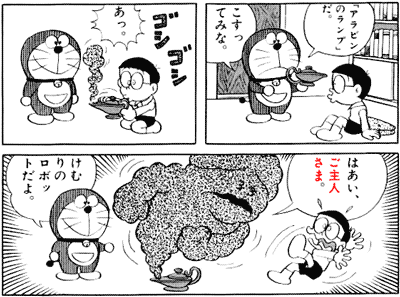
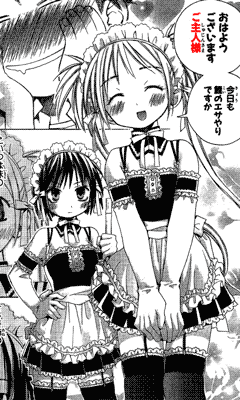
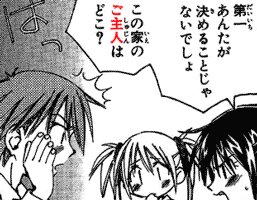
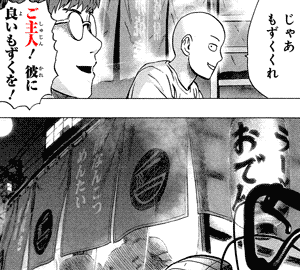
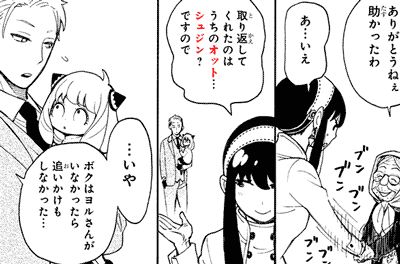
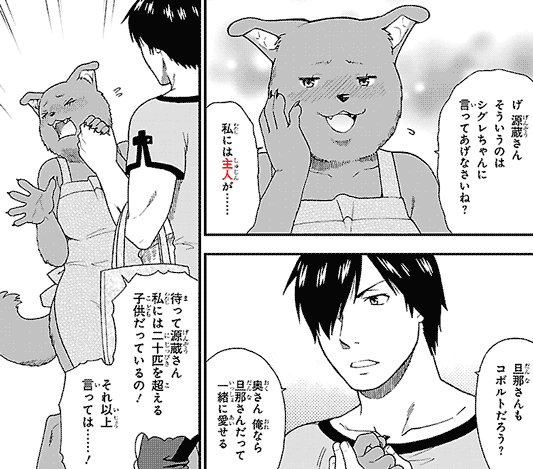

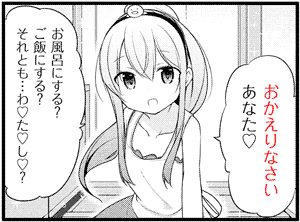
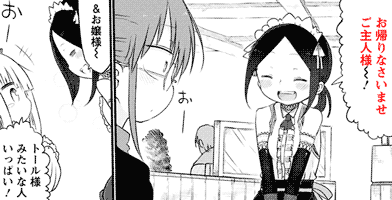
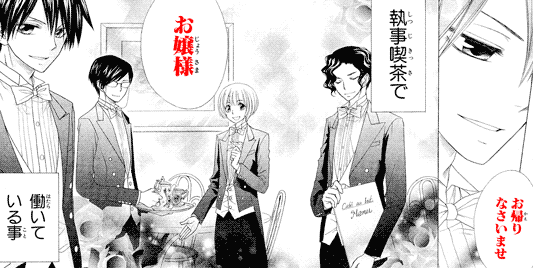

![This manga made me realize checkerboard floor tiles look pretty neat. goshujinsama ga kita wa yo, "Master" came [back, look]. Quote from manga Tokyo Ghoul, torture scene](https://blogger.googleusercontent.com/img/b/R29vZ2xl/AVvXsEjoEVuvYgW7P2S1pwz30y1zMILA9k1lbQCCpWza2mdF8Cph-3NTdneTXgmXg9l79nKxZnO_naF_RpBzUvUlHzB4dvbBOUAHo0UG1qIIIDaCnCFHtPEzRQXR0QccDB8qvrxYy1fT-oDRtKA/s1600/goshujinsama-tokyo-ghoul.png)
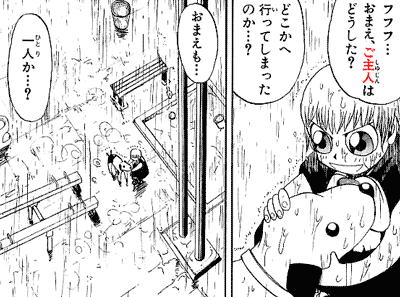
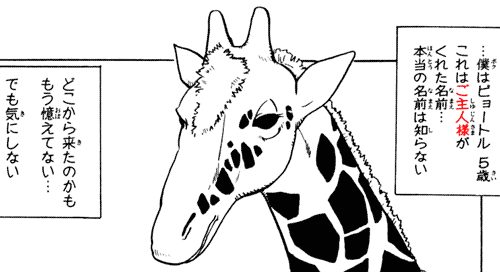
![MC got dog-zoned... like in Log Horizon, but worse Anta wa watashi no "tsukaima" nano yo!? Goshujinsama no meirei nara donna koto demo yorokonde suru...... "inu" nano yo!! You are my "familiar," [get it]? When it comes to [your] master's orders whatever it is [you] rejoice and do it...... a "dog," [get it]?!](https://blogger.googleusercontent.com/img/b/R29vZ2xl/AVvXsEg_-MP1ckRgQBCM4Y_MTt4ffWc0JuI3CxWrIDfQFTt7DqssREhSHucICsJHBEPeSyM4evnss5eotsJDKDg1pHg16r86n1gGVswP3QoatE5gWEBnw7JwBcIbMYRvKI0YPyiCvoQsyEPyKjE/s1600/goshujinsama-zero-no-tsukaima.png)
![This guy looks like he really wants to get called that. sore kara omaera, ore no koto wo yobu toki wa, "goshujinsama" ka Yoshitaka-sama to yobe. Besides that, you [girls]. When you call me, call [me] "Master" or Yoshitaka-sama. Sore ja ore ga kattara sono fuku wo kite ore no koto wo goshujinsama to yobunda na. Then if I win [you'll] wear those clothes and call me master, right? Sono kawari shouhai ni kankei naku kiru shi, chanto goshujinsama to yobimasu kara. In exchange for that, no matter who wins, I'll these clothes [and] properly call [you] master. Quote from manga Kore ga Watashi no Goshujinsama これが私の御主人様](https://blogger.googleusercontent.com/img/b/R29vZ2xl/AVvXsEhDUsywcDt7TmH-hvh4Fs66KDWhxri7V6tIx8z4ibT1JVBIatAHaefG0Mw5ExEF_Ymrq8RIgwyGY3zLngvvThYqHqE7jUGDSLuM3PEQUho9zp8FmsQ_sF4wmRXTR8cfgseEfYf2m2AXHOc/s1600/goshujinsama-to-yobe-kore-ga-watashi-no.png)
I'm very amazed that you're still posting this much content. I initially thought you're Japanese because of how detailed your posts are but surprisingly, the disclaimer says you're just learning as well. So impressive! Thank you for sharing your knowledge with us!
ReplyDelete